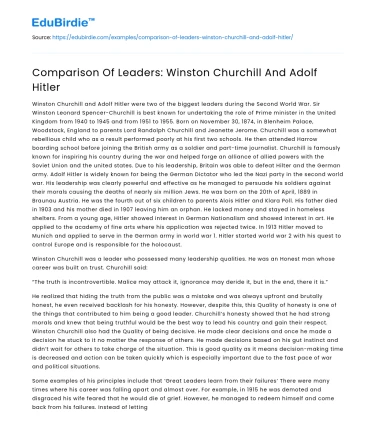Winston Churchill and Adolf Hitler were two of the biggest leaders during the Second World War. Sir Winston Leonard Spencer-Churchill is best known for undertaking the role of Prime minister in the United Kingdom from 1940 to 1945 and from 1951 to 1955. Born on November 30, 1874, in Blenheim Palace, Woodstock, England to parents Lord Randolph Churchill and Jeanette Jerome. Churchill was a somewhat rebellious child who as a result performed poorly at his first two schools. He then attended Harrow boarding school before joining the British army as a soldier and part-time journalist. Churchill is famously known for inspiring his country during the war and helped forge an alliance of allied powers with the Soviet Union and the united states. Due to his leadership, Britain was able to defeat Hilter and the German army. Adolf Hitler is widely known for being the German Dictator who led the Nazi party in the second world war. His leadership was clearly powerful and effective as he managed to persuade his soldiers against their morals causing the deaths of nearly six million Jews. He was born on the 20th of April, 1889 in Braunau Austria. He was the fourth out of six children to parents Alois Hitler and Klara Poll. His father died in 1903 and his mother died in 1907 leaving him an orphan. He lacked money and stayed in homeless shelters. From a young age, Hitler showed interest in German Nationalism and showed interest in art. He applied to the academy of fine arts where his application was rejected twice. In 1913 Hitler moved to Munich and applied to serve in the German army in world war 1. Hitler started world war 2 with his quest to control Europe and is responsible for the holocaust.
Winston Churchill was a leader who possessed many leadership qualities. He was an Honest man whose career was built on trust. Churchill said:
Save your time!
We can take care of your essay
- Proper editing and formatting
- Free revision, title page, and bibliography
- Flexible prices and money-back guarantee
“The truth is incontrovertible. Malice may attack it, ignorance may deride it, but in the end, there it is.”
He realized that hiding the truth from the public was a mistake and was always upfront and brutally honest, he even received backlash for his honesty. However, despite this, this Quality of honesty is one of the things that contributed to him being a good leader. Churchill’s honesty showed that he had strong morals and knew that being truthful would be the best way to lead his country and gain their respect. Winston Churchill also had the Quality of being decisive. He made clear decisions and once he made a decision he stuck to it no matter the response of others. He made decisions based on his gut instinct and didn’t wait for others to take charge of the situation. This is good quality as it means decision-making time is decreased and action can be taken quickly which is especially important due to the fast pace of war and political situations.
Some examples of his principles include that ‘Great Leaders learn from their failures’ There were many times where his career was falling apart and almost over. For example, in 1915 he was demoted and disgraced his wife feared that he would die of grief. However, he managed to redeem himself and come back from his failures. Instead of letting his career end due to his mistakes he reflected on them and learned from them which in turn resulted in him becoming a much more successful leader. This principle made him a good leader as it showed strength and dedication. It showed that he was able to improve on himself rather than dwell on the past. Another principle of Churchill was that great leaders know how to enjoy life. Churchill was dedicated, hardworking, and productive and it is argued that this is down to his ability to relax.it was said that:
“Churchill’s great strength was his power of relaxation”
This principle made him an excellent leader as he knew what he had to do but he also understood that having a good balance between work and life made being dedicated and focused on his work much easier. This allowed him to be much more productive and this is essential for leadership as you will never be able to gain to attention or respect of other people if you are more focused or dedicated yourself.
Winston’s leadership style was seen to be a Transformational and Charismatic style. Transformational leaders usually inspire staff through effective communication and this is something Winston was extremely skilled at.






 Stuck on your essay?
Stuck on your essay?

